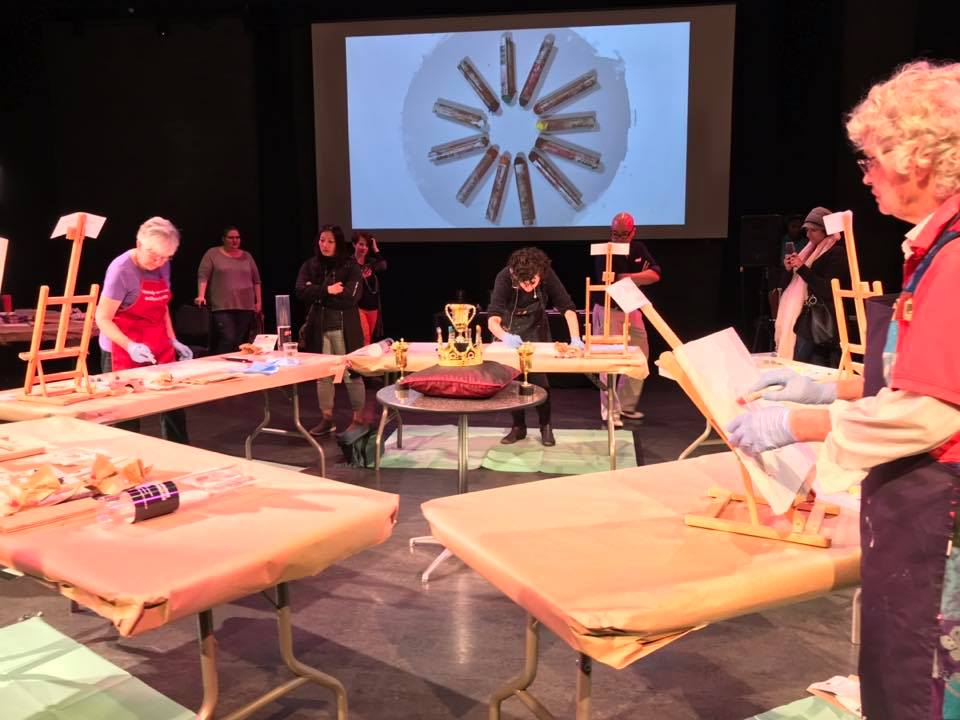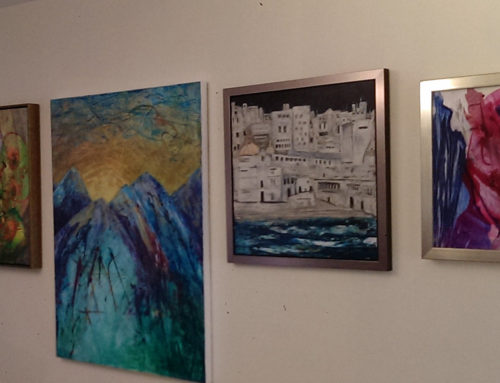How have feelings of overwhelm impacted your creative works?
In today’s world, with a constant flow of ideas and unrealistic to-do lists, we wrestle daily with narrowing our choices. Variety is both seductive and destructive to our focus. Most creators have more ideas than lifetimes to fill on the activities that their ideas produce. As we continue to generate new ideas, we need to harness our ability to scan and prioritize, control our thoughts, and give ourselves time to create, listen, honour our process, and follow where it leads.
You may be hurrying to meet deadlines, trying to catch up on other projects, have piles of clutter awaiting your attention; everywhere you look you see things that need to be done. Trying to do it all now will drive you crazy. If you try, you’re liable to start one thing, be confronted with a second, and end up with a mess, and then all your time has disappeared. You’re overwhelmed and feeling behind the eight ball, without any sense of having accomplished much.
Causes of Overwhelm
“It’s not our circumstances that determine how we feel, but the circumstances that we choose to focus on.”
Outside pressures – Too many demands on your time from family and work, sucks the creative juices dry. The mind has no room to feel creative, and no space to think creatively in this environment. Setting boundaries to reclaim time, and give ourselves room to relax and allow for our creative juice to flow again is necessary.
Internal pressures– Putting pressure on ourselves works for and against our creativity. If we choose to set realistic deadlines in working towards a creative goal, we can create like a mad. But if we aren’t being realistic, and we recognize that we have set our bar too high, it can completely paralyze us. Keep your goals challenging but achievable.
Judgements – Worrying about the judgments that others may be making on your work is depressing and demoralizing. Our creative process is a learning in progress. We need to exercise more compassion for self, and control our state of mind. Others judgements of you only impact you when you choose to believe them.
Hazy perspectives – Feeling overwhelmed is a perspective that doesn’t serve us. Going to a peaceful place to relax, letting go of our concerns and expectations, and slowing down will create room to reflect and see what this perspective is all about. This is a conscious move to take ourselves out of overwhelm and into reflection and awareness. Then we can begin to explore how we can creatively solve this overwhelm issue.
Choice-it-is – Choices are overwhelming when we want to have them all. We must resist all the shiny objects that do not serve our mission. With each choice we make, we define our lives, including who we are, and where we are headed.
Unresolved issues – We need mental space to create. Thinking creatively requires us to get any nagging issues out of our head. Sometimes we can clear our mind by giving our problems to the universe to solve, and sometimes we need to get support.
Difficult challenges – Reframing difficult challenges is a way to open up creative resources again. When a challenge is much higher than our level of skill, we go straight into stress and overwhelm. Pulling back on the challenge by breaking things down into steps helps us address the challenge more effectively.
Lack of stamina – We need to address our health, and calm our nervous system to have our brain work well. Take time to sit and think of nothing, relax and tend to our muscles and our body, and get just enough exercise to rebuild energy. Once energy is restored, creative capacity will return.
Moving from Overwhelm to Creativity
1) Control Your State of Mind:
All or nothing thinking is unrealistic, confounding, and can lead to avoidance and self sabotage. How many harmful, destructive, or limiting ‘perceived realities’ do you cling to, stress over, and even fight for as though they were the bare facts? Build your awareness of your state of mind. Notice these thoughts that do not serve your creative process.
2) Manage Expectations:
To manage expectations, we need to acknowledge our achievements. Have we made promises to ourselves/others that we either cannot keep, or do not in our heart want to keep? Some expectations come in the form of having done something the same way for so long, that it is expected that you will continue in that way. Being creative requires us to do something different, not continue to cater to others’ expectations, or even our own for that matter.
3) Reduce resistance:
Resisting that which we do not want, only takes you straight to that place, because this is what you are focusing on. If you are resisting mistakes, other people’s suggestions, or getting down to work, you are making a choice, and that choice will force a particular kind of outcome.
4) Change negative perception:
If your perception is not working for you, find a new focus. True optimism is about choosing a positive attitude about any situation. We can choose to look for possibilities that generate passion for our actions. We need to be able to visualize the possibilities that may result from our choices, and recognize that there is always something positive no matter what the outcome.
5) Attend to Your Health:
How are your treating yourself as a divine instrument of creativity? Attending to our health is not just following up on our medical issues, it is a whole body effort. This includes exercise, nutrition, rest, and meditation.
Practice Focus to Make Room for your Creativity
Fine your focus by completing the following sentences, with at least 5 endings each. Once you are done, your priorities will be clear. And you can move out of overwhelm and into purposeful action.
- I need….
- I want…
- I don’t need…
- I don’t want…
Happy Creating!

This work by Joanne Dennis is licensed under a Creative Commons Attribution-NonCommercial-NoDerivs 3.0 Unported License.






